This April, celebrate National Poetry Month by introducing a child to the many forms of poetry, convincing reluctant teen readers to try a poem each day or by starting a stimulating discussion among friends through poetry that blends the aesthetic and the political. Poetry is for everyone!
For Children:
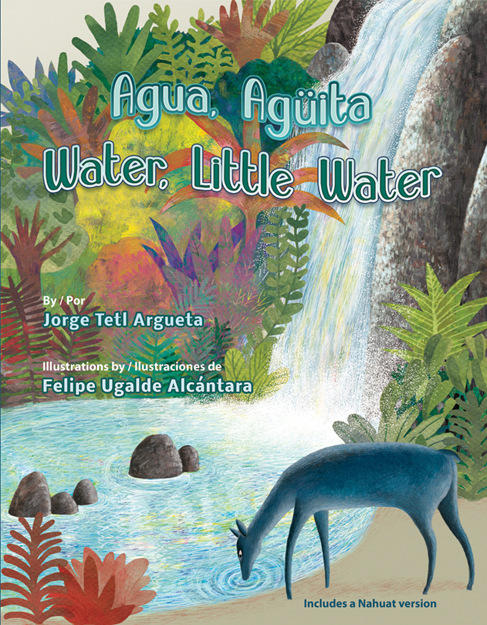
Agua, Agüita / Water, Little Water by Jorge Argueta, illustrated by Felipe Ugalde Alcántara
From its birth deep in Mother Earth, Little Water climbs to the surface, passing through roots and rocks, light and darkness. Finally, the tiny bead of water makes it to the top and rests, “a sigh of morning dew,” hanging on “the tips of leaves / on spider webs / or on the petals / of flowers.” The droplet becomes a river, a lake, an ocean, ultimately climbing to the sky and turning into a cloud. Then, “drop by drop / I return singing / to our Mother Earth. I am Little Water. / I am life.”
With stunningly beautiful illustrations by Felipe Ugalde Alcántara that depict the mountains, rocks, vegetation and animals of the natural world, this poem about the importance of water reflects Argueta’s indigenous roots and his appreciation for nature. Containing the English and Spanish text on each page, the entire poem appears at the end in Nahuat, the language of Argueta’s Pipil-Nahua ancestors. This book is an excellent choice to encourage children to write their own poems about the natural world and to begin conversations about the interconnected web of life.
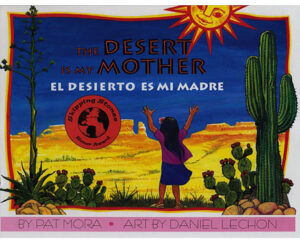 The Desert Is My Mother / El desierto es mi madre by Pat Mora, illustrated by Daniel Lechón
The Desert Is My Mother / El desierto es mi madre by Pat Mora, illustrated by Daniel Lechón
A beautiful poetic and artistic rendition of the relationship between nature and Hispanics and Native American peoples. Rather than being an expanse empty of life and value, the desert is lovingly presented as the provider of comfort, food, spirit and life. The first picture book published by Piñata Books, this text introduces the partnership of an award-winning poet and a prize-winning painter.
For Young Adults:
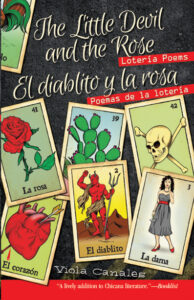 Little Devil and the Rose: Lotería Poems / El diablito y la rosa: Poemas de la lotería by Viola Canales
Little Devil and the Rose: Lotería Poems / El diablito y la rosa: Poemas de la lotería by Viola Canales
Cultural traditions permeate these verses, from the curanderas who cure every affliction to the daily ritual of the afternoon merienda, or snack of sweet breads and hot chocolate. The community’s Catholic tradition is ever-present; holy days, customs and saints are staples of daily life. Fond childhood memories of climbing mesquite trees and eating raspas are juxtaposed with an awareness of the disdain with which Mexican Americans are regarded. Texas museums, just like its textbooks, feature cowboy boots worn by Texas Rangers, but have no “clue or sign of the vaqueros, the original cowboys / or the Tejas, the native Indians there.” Inspired by the archetypes found in the Mexican bingo game called lotería, these poems reflect the history—of family, culture and war—rooted in the Southwest for hundreds of years.
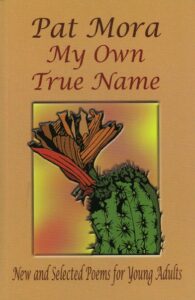 My Own True Name by Pat Mora
My Own True Name by Pat Mora
A major selection of new and previously published poems chosen by Pat Mora with young-adult readers in mind. Using the cactus plant as her guiding metaphor for our existence, she presents more than sixty poems grouped variously into “Blooms,” “Thorns,” and “Roots.” Each section opens with a graceful line drawing from artist Anthony Accardo, and the whole is prefaced by a whimsical and intimate introduction, “Dear Fellow Writer.”
My Own True Name, an anthology fifteen years in the making, is sure to be sought by deeply rooted and still-budding lovers of poetry.
For Adults:
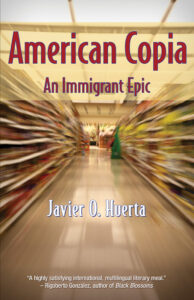 American Copia: An Immigrant Epic by Javier O. Huerta
American Copia: An Immigrant Epic by Javier O. Huerta
In this innovative work that uses grocery stores as a guiding motif, Huerta deftly combines English and Spanish to explore his identity as an immigrant, naturalized citizen, son, brother, lover, graduate student.
Through poetry written in Spanish, a short play, non-fiction passages and even text messages, Huerta delves into subjects such as consumerism and health foods available only to a limited class of people. The diverse pieces and themes in American Copia pulsate with all that can be both communal and autonomous in everyday life. Though Huerta touches on serious subjects, many of these short vignettes are quirky and humorous. His is an original, evocative voice that articulates the immigrant perspective to create a thought-provoking look at the land of plenty. This is a must-read for anyone interested in experimental or Mexican-American literature.
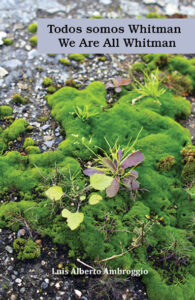 Todos somos Whitman / We Are All Whitman by Luis Alberto Ambroggio
Todos somos Whitman / We Are All Whitman by Luis Alberto Ambroggio
 Luis Alberto Ambroggio was inspired to respond to Whitman’s work after translating a series of essays about Song of Myself. This collection of 53 poems in English and Spanish is the result. Sometimes he includes a line from the master in his own piece, other times an epigraph introduces the verse. Either way, Whitman’s influence is notable. Many of Ambroggio’s poems—like Whitman’s—deal with physical pleasure. A native of Argentina, the poet views Whitman’s work through his Latin American lens, noting that Whitman’s “multitudes” include those who will not be denied, ignored or declared undocumented. Other poems consider nature and death.
Luis Alberto Ambroggio was inspired to respond to Whitman’s work after translating a series of essays about Song of Myself. This collection of 53 poems in English and Spanish is the result. Sometimes he includes a line from the master in his own piece, other times an epigraph introduces the verse. Either way, Whitman’s influence is notable. Many of Ambroggio’s poems—like Whitman’s—deal with physical pleasure. A native of Argentina, the poet views Whitman’s work through his Latin American lens, noting that Whitman’s “multitudes” include those who will not be denied, ignored or declared undocumented. Other poems consider nature and death.
Focusing on themes of identity, love, and life, this collection will inspire readers to understand the universality in us all. Ultimately, we will all go to where we came from, “air, shadow, sun, dust.” Originally published in Spanish by Vaso Roto Ediciones, this edition includes the original Spanish text and a luminous English translation by Brett Alan Sanders.

Diaspora: Selected and New Poems by Frank Varela
In this collection of 55 poems, Varela writes about growing up Puerto Rican in Brooklyn, noting that there are two types of Puerto Ricans: “those born on the island, / others like me, / the children of exiles.” Pondering the universal sentiment of immigrant children, he notes that he was considered a spic in the United States and a gringo in the land of his parent’s birth. “All I wanted was the impossible: / To be the who I am in a land / unafraid of the me I have become.”
Like his grandfather who cleared ten acres in Cibuco, Puerto Rico, “to wrench subsistence from red clay,” Varela loves the land and what it provides. “The land is rich with decay and past seasons. / On my best days, I can reach into the soil / and marry my soul with the green world— / tarragon, escarole, lemon balm, sage.” Expressing love and appreciation for his Puerto Rican family and culture, Varela’s poems reflect on the universal joys and pains of everyday life. This collection contains a mix of previously published and new poems that offers a survey of the poet’s work from 1988 to the present.
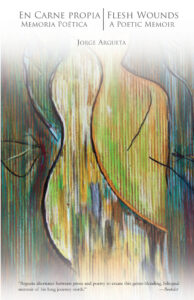 En carne propia: Memoria poética / Flesh Wounds: A Poetic Memoir by Jorge Argueta
En carne propia: Memoria poética / Flesh Wounds: A Poetic Memoir by Jorge Argueta
 In this moving, bilingual collection, renowned poet Jorge Argueta reminisces about growing up in El Salvador, the impact of war on his family and neighbors, life as an exile in the United States and ultimately his rebirth as a poet. He became involved in the revolution as a teen, not realizing what was to come. Mothers lose sons, their bodies beat beyond recognition. Friends’ bodies are thrown into common graves. Husbands lose wives and wives lose husbands. Argueta’s words recall the horrific violence and atrocities committed, frequently against the poor and powerless.
In this moving, bilingual collection, renowned poet Jorge Argueta reminisces about growing up in El Salvador, the impact of war on his family and neighbors, life as an exile in the United States and ultimately his rebirth as a poet. He became involved in the revolution as a teen, not realizing what was to come. Mothers lose sons, their bodies beat beyond recognition. Friends’ bodies are thrown into common graves. Husbands lose wives and wives lose husbands. Argueta’s words recall the horrific violence and atrocities committed, frequently against the poor and powerless.
The 48 poems in this collection—in Spanish and English—smolder with loss and longing. Argueta’s indigenous Pipil-Nahua roots ultimately contribute to his salvation after he flees his homeland. In San Francisco, he becomes part of the city’s exile community, yearning for home but knowing his friends and relatives are dead or gone. Eventually, he returns to writing and becomes a successful children’s book author. In spite of the pain and sorrow expressed in many of these poems, Argueta’s work is a powerful testament to love, hope and the strength of the human spirit.
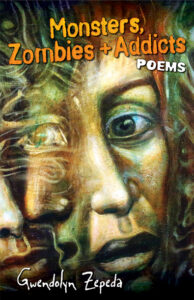 Monsters, Zombies and Addicts: Poems by Gwendolyn Zepeda
Monsters, Zombies and Addicts: Poems by Gwendolyn Zepeda
This collection of 62 narrative poems contains witty observations about the rituals of contemporary life. In “Cocktail Hours,” Houston Poet Laureate Gwendolyn Zepeda wonders, “What if all my nights were Christmas lights on patios with tinkling drinks / and fun conversations.” And in “Recipe for Fun,” Zepeda offers a ten-point guide to soothing away life’s frustrations, including a suggestion to get some peace by giving “everyone in your house pizza, cat food or video games.”
Musings on family, remembrances of childhood games and encounters with strangers (and ants!) fill this clever, thought-provoking collection in which Zepeda dares to express her individuality. She doesn’t follow others blindly, or do what society expects of her. Readers will appreciate this second poetry collection, which is deeply personal yet universal in its hopes and fears.
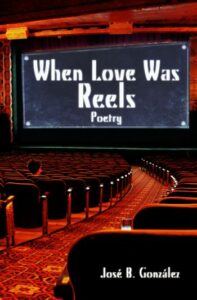 When Love Was Reels: Poetry by José B. González
When Love Was Reels: Poetry by José B. González
Expressing his longing not to be forgotten like so many abandoned children in his native country, José B. González writes about a young boy’s life—first in El Salvador under the care of his grandmother and later living with his uncle in New York City—in this moving collection of narrative poems that uses iconic Latin American and Latino films as a guiding motif.
In each poem, famous movie and TV scenes featuring icons likes Pedro Infante and Cantinflas and modern stars such as Elizabeth Peña, Edward James Olmos and Esai Morales are juxtaposed with important moments in the boy’s life. Providing a tribute as well as a criticism of the way that film and television portray Latino lives, the collection is also notable for shedding light on the lives of so many youth raised by grandmothers in Latin America as the generation in-between went in search of the American Dream. These poems hauntingly illuminate Salvadoran immigration to the United States.
Anthologies:
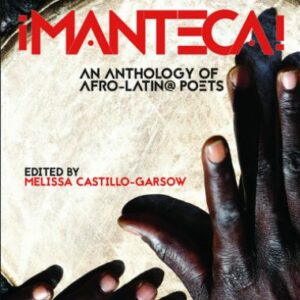 ¡Manteca! An Anthology of Afro-Latin@ Poets edited by Melissa Castillo-Garsow (April 30, 2017)
¡Manteca! An Anthology of Afro-Latin@ Poets edited by Melissa Castillo-Garsow (April 30, 2017)
 Containing the work of more than 40 poets—equally divided between men and women—who self-identify as Afro-Latino, ¡Manteca! is the first poetry anthology to highlight writings by Latinos of African descent. The themes covered are as diverse as the authors themselves. Many pieces rail against a system that institutionalizes poverty and racism. Others remember parents and grandparents who immigrated to the United States in search of a better life, only to learn that the American Dream is a nightmare for someone with dark skin and nappy hair. But in spite of the darkness, faith remains. Anthony Morales’ grandmother, like so many others, was “hardwired to hold on to hope.” There are love poems to family and lovers. And music—salsa, merengue, jazz—permeates this collection.
Containing the work of more than 40 poets—equally divided between men and women—who self-identify as Afro-Latino, ¡Manteca! is the first poetry anthology to highlight writings by Latinos of African descent. The themes covered are as diverse as the authors themselves. Many pieces rail against a system that institutionalizes poverty and racism. Others remember parents and grandparents who immigrated to the United States in search of a better life, only to learn that the American Dream is a nightmare for someone with dark skin and nappy hair. But in spite of the darkness, faith remains. Anthony Morales’ grandmother, like so many others, was “hardwired to hold on to hope.” There are love poems to family and lovers. And music—salsa, merengue, jazz—permeates this collection.
Editor and scholar Melissa Castillo-Garsow writes in her introduction that “the experiences and poetic expression of Afro-Latinidad were so diverse” that she could not begin to categorize it. Some write in English, others in Spanish. They are Puerto Rican, Dominican and almost every combination conceivable, including Afro-Mexican. Containing the work of well-known writers such as Miguel Piñero and E. Ethelbert Miller, less well-known ones are ready to be discovered in these pages.
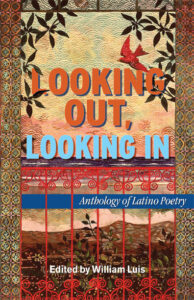 Looking Out, Looking In: Anthology of Latino Poetry edited by William Luis
Looking Out, Looking In: Anthology of Latino Poetry edited by William Luis
The poems included in this comprehensive anthology run the gamut of styles and themes, but all are by Latinos writing from the mid-twentieth century to the present. Some deal with issues specific to the Hispanic experience, such as displacement, identity, and language. In “Who Is Going to Tell Me?,” Puerto Rican/Dominican Sandra María Esteves chastises her Spanish ancestors “who captured my mother as slave, stripped her naked, / plowed treasures from her shores,” and wonders where she can learn about her African forefathers: “In whose library will I find their books? Tales of their lives?”
More than 80 Latino poets are represented in this wide-ranging collection that focuses on poetry from the four largest groups in the United States: Mexican Americans, Cuban Americans, Puerto Ricans, and Dominican Americans. In his introduction, scholar William Luis gives an overview of the origins of Latino literature in the United States, providing historical, political and cultural frameworks for these groups and their writings.
Click here to view more of Arte Público’s poetry collections.




